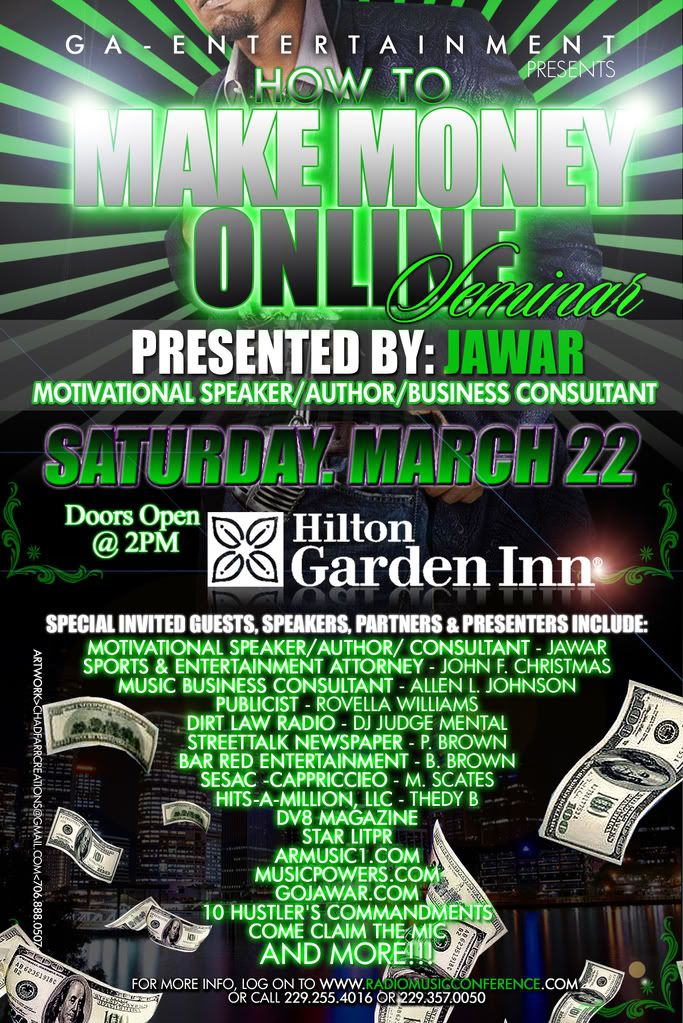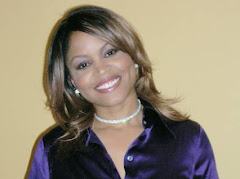In previous posts, I've given you over 40 tips on the do's and don'ts of networking at music conferences, the do's and don'ts of networking via email, upcoming music conferences to network at, telling you why networking is important and how it's helped me. Now I want to give you some physical places that you can network as a songwriter, producer, engineer, musician, artist, band, group, and music executive. Some of the places noted below are typical places but some are not typical. Later I will provide some more general places online where you can network.
- music conferences - look for ones in your area, in other cities, and even abroad. Read my prior blogs and JaWar's blogs at atlantashowcase.blogspot.com and mymusicconference.blogspot.com for details on upcoming conferences.
- music seminars - look for local groups who are putting on one-day events. Read my prior blogs and JaWar's blogs at atlantashowcase.blogspot.com and mymusicconference.blogspot.com for details on upcoming conferences.
- talent showcases - again you can find artists, producers, A & R folks, etc at these events. In fact, I just bumped again into Bryan-Michael Cox, Kawan KP Prather, DJ Nabs, and some of the other panelists from Patchwerk's Music University that I attended in January at Rovella William's Almost Famous Artist Showcase. You just never know who you are going to meet at these events. JaWar again has a complete list of talent showcases at atlantashowcase.blogspot.com and mymusicconference.blogspot.com.
- open mics - you might get a hodge podge of folks at this event but it still may be worth your time. I'd choose the ones where people have to audition to perform over just simply an open mic but still it's better than nothing. Read JaWar's blogs at atlantashowcase.blogspot.com and mymusicconference.blogspot.com for details on upcoming open mics.
- open auditions - American Idol auditions usually bring out hundreds of thousands of folks! Sometimes I wonder where all these people are at when the music conferences come to town! Seems everyone wants to sing, and not many want to learn the business! Then folks wonder why they get taken! Okay, I'm off my soap box but network at these events; learn the business at music conferences or again read books on it.
- beat battles - these are cropping up all over the U.S. for producers. As a songwriter needing producers, I'd definitely check this event out. Producers and songwriters are always looking for each other.
- clubs - I personally don't typically go to clubs. But if you want to network with DJs, you've got to go to the clubs to find them to get your music played there.
- music industry parties - join some of the newsletters to find out where and when these events will take place or read JaWar's blogs at atlantashowcase.blogspot.com and mymusicconference.blogspot.com
- performance right organization's parties, especially the special event parties such as holiday parties.
- songwriter organization parties and events, ex. NARAS puts on different events such as meet the producer or songwriter events, or host special parties to recognize their members.
- record pool events - there have already been two of these this year.
- DJ conferences - another great place to meet DJs and get them your material.
- Film and TV conferences - since you want placement in film and TV, this is an excellent place to network. Don't forget indie film and TV.
- New Media/Digital Music Conferences - the music biz is changing - stay up on the game.
- Mobile Phone/Mobile Website conferences - folks we are moving into mobile - network with phone companies about getting your music put into mobile phones.
- Award shows - if you live in LA, there are always award show events being held there. Go to some of them. At the very least you can meet and make some new fans of your music. You might even meet some people in the industry.
- Networking events outside the music business - since it seems everybody is a rapper/producer/singer, you're bound to meet other music creators at other networking events. I met a producer and singer and a woman needing a songwriter at a Millionaire Mind Intensive seminar.
- Karaoke bars - if you are looking for demo singers, this may be a spot to check out. Plus, by doing karaoke, you know that they don't mind singing for cheap (:-O
- Studios - here's the place where you can meet engineers, mixers, producers, professional demo singers, artists, etc. Plus some studios will have their own events that they put on. Patchwerk is one of the studios that does events from time to time.
- Concerts - haven't we all seen the "flyer guy" at the doors of a concert passing out flyers? You can do the same thing with your CDs and make some fans of your music.
- Music retail stores - are you kidding?! You can meet plenty of musicians, producers, engineers, DJs, songwriters, etc. at these stores. Plus, just meeting the people behind the counters who know how to work the music equipment you're about to buy is good enough reason to go there and network!
- Bookstores - in the music section of the book store are learners and students of music just like you!
- Colleges & university - Sometimes colleges, universities, law schools and even high schools have music business departments and music business groups which put on music conferences and seminars. Sometimes you may want to just go when there is not a conference, just to meet the professors and network with the students.
- Trade shows - like NAMM, NARM, NAB are good trade shows where you can network with music merchandisers. Digidesign in fact will be at NAB (April 14-17, 2008) in Las Vegas.
- Radio Broadcaster Conferences - this will help you not only meet radio personalities, but you'll also get some good tidbits on what PMs are looking for.
- Gamers Conferences - since more and more music is being placed in games, you want to attend these events as well.
- Targeted Niche Conferences - go to conferences that will also help you learn what your particular niche is wanting and buying. For instance, Billboard is hosting a number of conferences this year which target teens and men.
- Record label parties - there are plenty of record labels that host events introducing either their label or their new artists. I recently attended one of those in December and met a lot of great industry folks who came out in support of the new production team, or artist!
- Producer parties - Sometimes producers will open up a new club, a new restaurant, or showcase their new signed artists. Check out those events.
- Magazine parties - I was invited out to a party being sponsored by a magazine and many, many industry people were scheduled to come.
- Music festivals - if your city or a surrounding city hosts things like music festivals, go! Make some new fans by passing out your CD. Find out who is putting it on and see if you can open up.
- Basketball/baseball/football games - arenas are always looking for groups to sing the National Anthem. Perform that song, then pass out your CD. Your name and group gets out and so does your music.
- Clothing stores - I heard this tip from JaWar - stores play background music all the time. Network with clothing stores and see if they will play your music or mix tape.
Want to know where to find some music conferences, showcases, open mics, and when they will be held? Check out my prior blog posts on upcoming conferences and JaWar's blogs at atlantashowcase.blogspot.com and mymusicconnection.blogspot.com
Thedy Bmyspace.com/hitsamillionllc - network with me!
hitsamillion.ning.com - network with others!
















